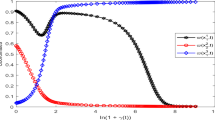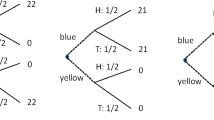Abstract
We analyze winner-pay contests in which players select bids, the winner is determined probabilistically through a contest success function, and only the winner must pay her bid. We show that a pure-strategy Nash equilibrium exists and is unique under weak assumptions on the contest success function. We determine the Nash equilibrium for several examples. We also consider how equilibrium bids are influenced by private information about the value of winning the contest.
Similar content being viewed by others
References
Alcedo, J., & Dahm, M. (2007). Tullock and Hirshleifer: a meeting of the minds. Review of Economic Design, 11(2), 101–124.
Baye, M., Kovenock, D., & deVries, C. (1996). The all-pay auction with complete information. Economic Theory, 8(2), 362–380.
Haan, M., & Schoonbeek, L. (2003). Rent seeking with efforts and bids. Journal of Economics, 79(3), 215–235.
Higgins, R., Shughart, W., & Tollison, R. (1985). Free entry and efficient rent seeking. Public Choice, 46(3), 247–258.
Klemperer, P. (1999). Auction theory: a guide to the literature. Journal of Economic Surveys, 13(3), 227–286.
Konrad, K. (2007). Strategy in contests—an introduction. Discussion Paper SP II, Wissenschaftszentrum, Berlin.
Malueg, D., & Yates, A. (2004). Rent seeking with private values. Public Choice, 119(1–2), 161–178.
Malueg, D., & Yates, A. (2005). Equilibria and comparative statics in two-player contests. European Journal of Political Economy, 21(3), 738–752.
Malueg, D., & Yates, A. (2006). Equilibria in rent-seeking contests with homogeneous probability functions. Economic Theory, 27(3), 719–727.
Matros, A., & Armanios, D. (2009). Tullock’s contest with reimbursements. Public Choice, 141(1–2), 49–63.
Simon, C., & Blume, L. (1994). Mathematics for economists. New York: Norton.
Skaperdas, S., & Gan, L. (1995). Risk aversion in contests. The Economic Journal, 105, 951–962.
Szidarovszky, F., & Okuguchi, K. (1997). On the existence and uniqueness of pure Nash equilibrium in rent-seeking games. Games and Economics Behavior, 18(1), 135–140.
Tullock, G. (1980). Efficient rent seeking. In J. Buchanan, R. Tollison, & G. Tullock (Eds.), Toward a theory of the rent-seeking society (pp. 97–112). College Station: A & M University Press.
Wärneryd, K. (2000). In defense of lawyers: moral hazard as an aid to cooperation. Games and Economic Behavior, 33(1), 145–158.
Author information
Authors and Affiliations
Corresponding author
Rights and permissions
About this article
Cite this article
Yates, A.J. Winner-pay contests. Public Choice 147, 93–106 (2011). https://doi.org/10.1007/s11127-010-9605-x
Received:
Accepted:
Published:
Issue Date:
DOI: https://doi.org/10.1007/s11127-010-9605-x




